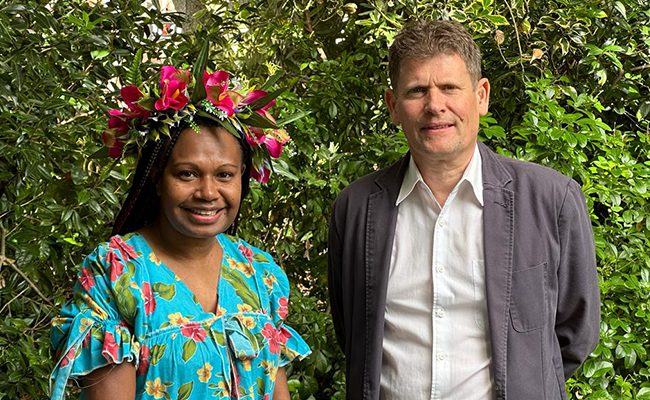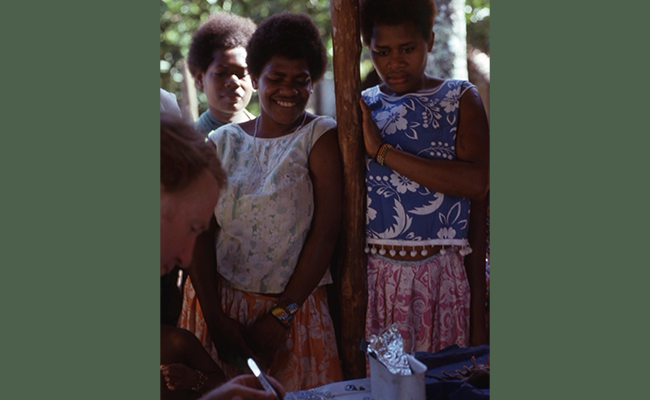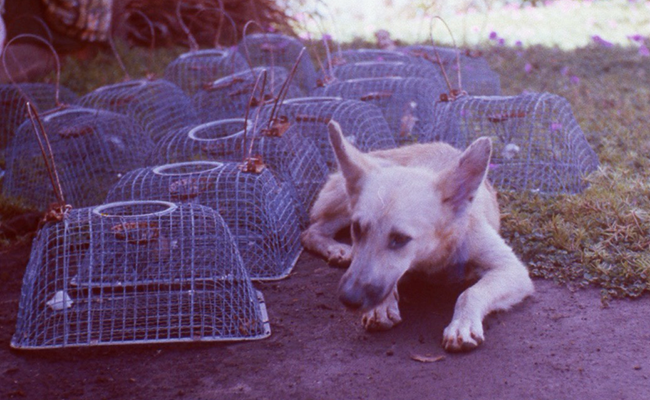
Leina Isno, left, and Professor John Crump.
The worship of a mite that spreads a potentially life-threatening disease in Vanuatu may make for some interesting challenges for a University of Otago student who plans to do research to inform the locals about the risks of the illness.
Leina Isno, a Professional Practice Fellow at Va'a o Tautai – Centre for Pacific Health has received funding from the Health Research Council (HRC) to conduct her research into scrub typhus, a disease that can lead to a life-threatening fever, in Vanuatu.
She will be the University's first ni-Vanuatu health sciences PhD candidate and will receive $260,000 over 36 months from the HRC to investigate the disease.
Scrub typhus has a fatality ratio of six percent and is spread via larval mites who latch onto human skin.
Isno, of the Denemus tribe, says this will be the first time a ni-Vanuatu researcher will be conducting health research in Vanuatu.
While completing her masters, Isno decided her next project would involve “giving back” to the people of Vanuatu.
Her colleagues recommended that she meet with Professor John Crump, who did research in Vanuatu through a University of Otago memorandum of understanding with World Vision.
He showed her a paper that was produced by Professor John Miles, Dr Frank J. Austin and Associate Professor Lance Jennings, three Otago researchers that went to Northern Vanuatu and the Solomon Islands to research scrub typhus in the 1970s.

Dr Frank Austen in Vanuatu, 1975.
This suggestion inspired Isno's PhD project. She knew she was going to have to “stand on the shoulders of great giants” and build upon the work already done in the region.
Associate Professor Jennings, a Clinical Associate Professor Virologist at the Christchurch campus, is on the advisory team for Isno's project and played a “big role” in her grant proposal.
She hopes a vaccine for scrub typhus will be an outcome of this research, but also wants to encourage the Vanuatu government to prioritise funding the highly effective antibiotic treatment doxycycline.
She hopes that through this research she will have the opportunity to educate her people about the dangers of the disease.
Isno will disseminate information to agricultural workers from Vanuatu who come to Aotearoa under the Recognised Seasonal Employer scheme, as they are the most exposed to the bug back home.
“We know that the agricultural workers and the labourers are at great risk of contracting this bug because it usually lives in grasses, savannah, or places where they've just recently been cleared off for logging or agricultural purposes,” Isno says.
She wants to know how ni-Vanuatu have lived with the disease over the decades, particularly because climate change contributes to the spread of the bacterium.
“What do we have in Vanuatu that might be helping to prevent infection? What is in the natural environment? Whether its lubricant, whether it's oils, or whether there is a special plant that the locals use to keep this bug away.”
She says the mite is worshipped in Vanuatu, which may present a challenge for Isno, who is trying to educate ni-Vanuatu about the risks associated with the bug.

Image from a research expedition in Northern Vanuatu, 1975.
“It's in our songs, it's in prayers, we have it ingrained in our traditional weapons. It's our god, it's sacred.”
It has been a transnational project from its conception, and Vanuatu's government, Ministry of Health and Cultural Centre have each contributed to her application and project.
The data collection will take place at Northern Provincial Hospital in Espiritu Santo, Vanuatu.
“A hospital will be primarily set up to collect data over the next year. They'll be doing everything as normal, but they'll be the main centre for data collection.”
The project will also provide insight into the status of the disease in Vanuatu today.
“Especially with climate change happening, I'm not so sure if the rates of scrub typhus infection have gone up in terms of this disease.”
Her own knowledge of ni-Vanuatu culture will be vital to her approach. A cultural ceremony will be performed with every community she engages with, and she also intends to gift them some putea as a gesture of reciprocity.
“As part of me going to different island groups, I have to perform cultural ceremonies before I get into a community.”
“I have nominated my father to do that on behalf of me. In those tribes, there is traditional dancing involved.”
Isno may have moved away from Vanuatu two decades ago to pursue a nursing career, but her relationship with the nation has remained strong.
She is a female chief in her tribe, a title she says makes her feel a “huge responsibility in terms of being a guardian to the people and to the elements”.
She also works with the South West Bay Tourism Association Committee to help small business owners in Vanuatu get back on their feet after COVID-19 disrupted travel.
“Recently, I've just raised $3,500 for the South West Bay Tourism Association. They've been so stoked. With COVID-19, they have not had any income at all for the last three years.”
Her research project will commence in June, 2023.
- Kōrero by Keilah Fox